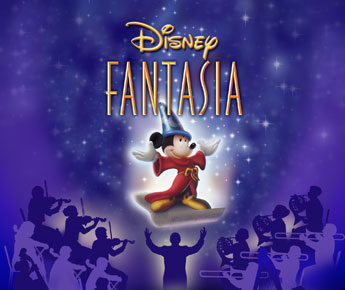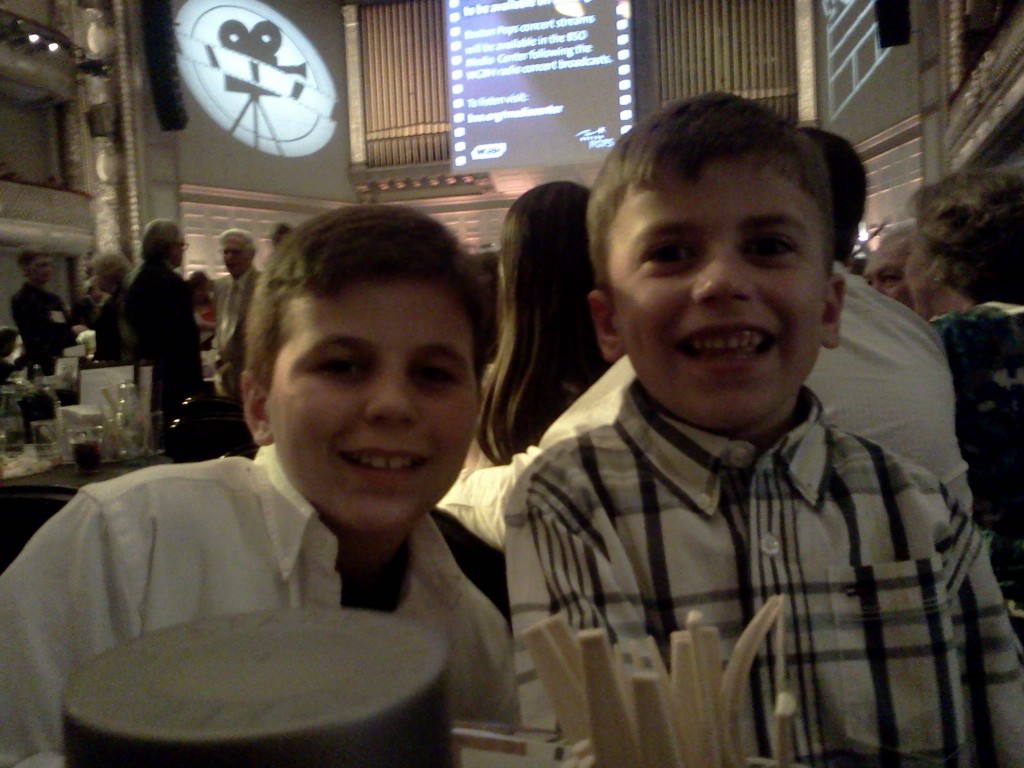Music Review: The Boston Pops does “Fantasia”
In the end, the technological snafu probably did more than the musical selections themselves to prove that listening to symphonic music live is not a stuffy affair.
By Scott McLennan
 Mickey Mouse is still magical, but these days the flying whales may overshadow him. At least that is the impression I was left with last night after listening to the Boston Pops perform music from Walt Disney’s epic cartoons Fantasia and Fantasia 2000 while watching clips from those two animated films playing on a screen suspended from the ceiling of Symphony Hall.
Mickey Mouse is still magical, but these days the flying whales may overshadow him. At least that is the impression I was left with last night after listening to the Boston Pops perform music from Walt Disney’s epic cartoons Fantasia and Fantasia 2000 while watching clips from those two animated films playing on a screen suspended from the ceiling of Symphony Hall.
For its 128th season, the Pops are paying tribute to music from American films, including concerts pegged to the two Fantasia movies, which marry classical and symphonic music to animated shorts. The final two Fantasia programs are at 3 and 8 p.m. today.
The Pops are generally family friendly and pushed the Fantasia concerts as particularly good for kids. So I took up the offer and brought my two nephews—ages 11 and 6—to the performance.
Neither had been to Symphony Hall before, and Star Wars has been profoundly more influential than Disney in their pop-culture universe. (Do you think Disney was unaware of the Force’s pull on young audiences when it took over the Star Wars franchise last year?) But like most sentient creatures on the planet, the boys were familiar with the iconic image of Mickey Mouse in sorcerer’s garb and also had a glancing familiarity with the Fantasia premise having visited the Disney theme park in Florida. So they were on board.
The concert began with a selection of non-Fantasia film scores. “They are going to kill me,” I thought to myself, but the boys enjoyed the music, especially when the Pops played the rousing “Flying Theme” from E.T. and the lighting department covered the hall with stars. (As resplendent as the Pops sounds thundering out themes from Lawrence of Arabia and “Unchained Melody” from Ghost, this afternoon’s “family matinee” skews more to the young ones with a selection of songs from Harry Potter and the Sorcerer’s Stone.)
After an intermission, “Fantasia – Live in Concert” began with the first movement of Beethoven’s Symphony No. 5, accompanied by dynamic impressionist images from Fantasia 2000 splashing and crashing above the orchestra. Conductor Keith Lockhart then led the Pops into a section from Beethoven’s Symphony No. 6, the composer’s “Pastoral” imagined by Disney animators (circa 1940) as a colorful scene out of Greek mythology with a jolly, rotund Bacchus, fields of centaurs and cupids, and a rather irksome Zeus.
Then things went haywire, technically speaking. The film cued up again to the Greek scene instead of moving on to the next scheduled piece, which happened to be the so-beloved “Sorcerer’s Apprentice.” Conductor Lockhart remained on stage, making frenzied phone calls, deadpanning a soft-shoe routine, and quipping “Live by technology, die by technology.”
My traveling companions to that point had been enjoying the music and the film images, though I later learned that Greek mythology is not heavily covered in school these days, so the flying babies and drunken reveler were taken more at face value than as a graphic interpretation of archetypes.
As harried techies tried to solve the glitch, the audience spontaneously burst out singing “The Star-Spangled Banner,” and the musicians, seizing on the opportunity, started playing along. Then, with a quick hand motion, Lockhart snapped the Pops into “Stars and Stripes Forever” and the audience roared with approval.
Thus a pitfall turned into reverie. In the end, the hiatus probably did more than the musical selections themselves to prove that listening to symphonic music live is not a stuffy affair.
When the action resumed, the hapless Mickey Mouse drew laughs as he bungled his magical spells and drew the ire of his boss, the mischief set to Paul Dukas’s music. Cinematically and musically, this sequence never ages.
Fantasia 2000 tried to do for Donald Duck what the original film did for Mickey, casting the irascible quacker in a Noah’s ark narrative set to the music of “Pomp and Circumstance.” Neither the music nor the animation is as delightfully transportive as “Sorcerer’s Apprentice,” though the Ark story has more resonance for contemporary kids than the frolics of Greek myth.
As for favorite moments from the re-vamped Fantasia, I would select a performance of Gershwin’s “Rhapsody in Blue” conceived as a set of interlocking New York City vignettes drawn in a manner to emulate the curvy lines of an Al Hirschfeld drawing. Pianist Michael Chertock provided plenty of flashy melodic power, while the rest of the Pops generated the requisite cinematic sweep.
My older nephew (the younger one had nodded off by then) was visibly struck agog while watching scenes of flying whales set to “The Pines of Rome.” The animation was a blend of realism and fantasy and graphically looked more in line with what he has been used to seeing growing up. Yet conceptually the sequence was very abstract. He was equally swept up in the Respighi score, which drew his highest praise: “That was cool.”
Scott McLennan covered music for the Worcester Telegram & Gazette from 1993 to 2008. He then contributed music reviews and features to the Boston Globe, Providence Journal, Portland Press Herald, and WGBH, as well as to the Arts Fuse. He also operated the NE Metal blog to provide in-depth coverage of the region’s heavy metal scene.

